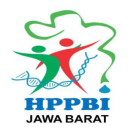Profile of Computational Thinking Skills in Environmental Change Learning through Virtual Laboratory
DOI:
https://doi.org/10.37150/rebion.v3i2.1829Abstract
Background: Computational thinking (CT) is a basic ability that everyone should have in the 21st century. CT as a thought process needed in formulating problems and solutions, so that problem solving is obtained quickly, precisely and effectively. The purpose of this study is to determine the profile of Computational thinking skills in learning environmental change through a virtual laboratory. Methods: The participants used in this study were class X MIPA 4 SMAN 2 Sukabumi for the 2020-2021 academic year with a total of 25 students. The research data was obtained by analyzing a paper-based Student Work Sheet (LKPD). LKPD was developed by integrating Computational Thinking in the stages of its learning activities. The results are assessed and analyzed based on a pre-compiled assessment rubric. The data analysis prepared in this study is to calculate the percentage of value gain from LKPD based on several CT pillars developed. Results: The results obtained the skill profile of the computational thinking pillars already owned by students, namely abstraction by 96.7%, algorithms by 92%, decomposition by 96.5% and pattern recognition by 96.25% Conclusion: Average conclusion overall computational thinking skills with good categories.
Keywords : Computational thinking; environmental changes; Virtual Laboratory
Downloads
Published
How to Cite
Issue
Section
License
Copyright (c) 2022 Report of Biological Education

This work is licensed under a Creative Commons Attribution-NonCommercial-ShareAlike 4.0 International License.










